Auditing Self Reflection
VerifiedAdded on 2023/06/05
|5
|1478
|313
AI Summary
The article talks about the author's experience in group work involving auditing and the learnings gained from it. The author reflects on the importance of considering different perspectives, listening, change management, and organization skills. The article also mentions relevant studies on auditing and ethics.
Contribute Materials
Your contribution can guide someone’s learning journey. Share your
documents today.
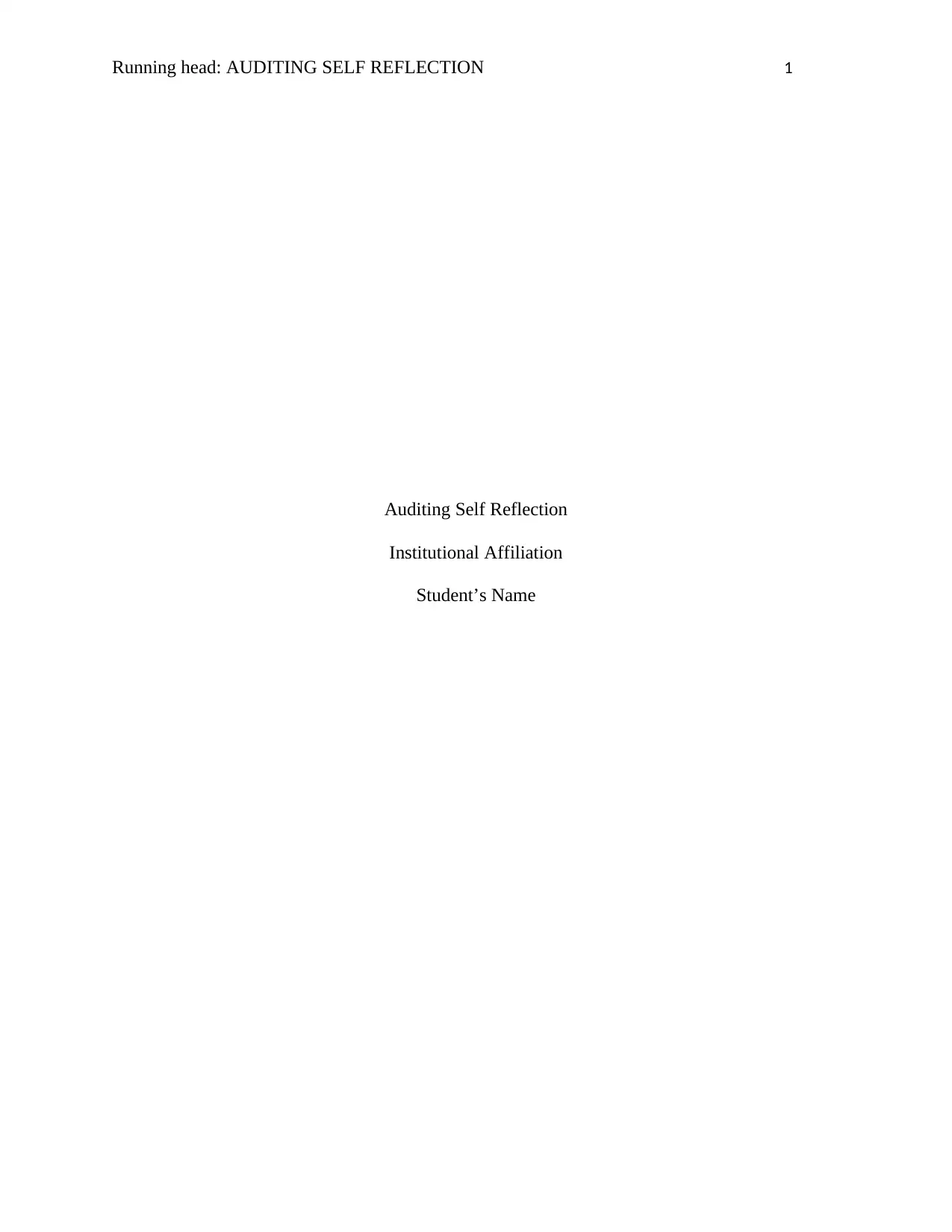
Running head: AUDITING SELF REFLECTION 1
Auditing Self Reflection
Institutional Affiliation
Student’s Name
Auditing Self Reflection
Institutional Affiliation
Student’s Name
Secure Best Marks with AI Grader
Need help grading? Try our AI Grader for instant feedback on your assignments.
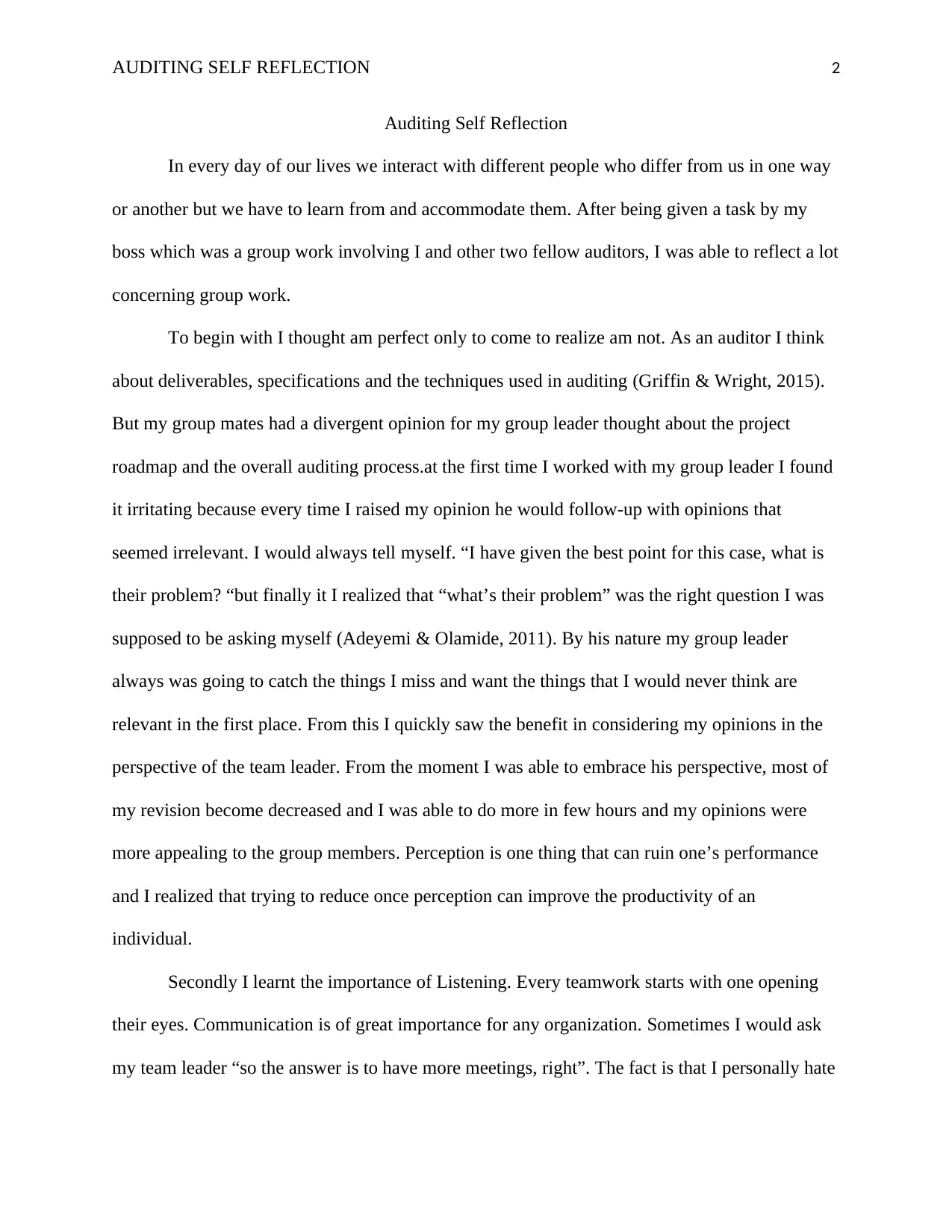
AUDITING SELF REFLECTION 2
Auditing Self Reflection
In every day of our lives we interact with different people who differ from us in one way
or another but we have to learn from and accommodate them. After being given a task by my
boss which was a group work involving I and other two fellow auditors, I was able to reflect a lot
concerning group work.
To begin with I thought am perfect only to come to realize am not. As an auditor I think
about deliverables, specifications and the techniques used in auditing (Griffin & Wright, 2015).
But my group mates had a divergent opinion for my group leader thought about the project
roadmap and the overall auditing process.at the first time I worked with my group leader I found
it irritating because every time I raised my opinion he would follow-up with opinions that
seemed irrelevant. I would always tell myself. “I have given the best point for this case, what is
their problem? “but finally it I realized that “what’s their problem” was the right question I was
supposed to be asking myself (Adeyemi & Olamide, 2011). By his nature my group leader
always was going to catch the things I miss and want the things that I would never think are
relevant in the first place. From this I quickly saw the benefit in considering my opinions in the
perspective of the team leader. From the moment I was able to embrace his perspective, most of
my revision become decreased and I was able to do more in few hours and my opinions were
more appealing to the group members. Perception is one thing that can ruin one’s performance
and I realized that trying to reduce once perception can improve the productivity of an
individual.
Secondly I learnt the importance of Listening. Every teamwork starts with one opening
their eyes. Communication is of great importance for any organization. Sometimes I would ask
my team leader “so the answer is to have more meetings, right”. The fact is that I personally hate
Auditing Self Reflection
In every day of our lives we interact with different people who differ from us in one way
or another but we have to learn from and accommodate them. After being given a task by my
boss which was a group work involving I and other two fellow auditors, I was able to reflect a lot
concerning group work.
To begin with I thought am perfect only to come to realize am not. As an auditor I think
about deliverables, specifications and the techniques used in auditing (Griffin & Wright, 2015).
But my group mates had a divergent opinion for my group leader thought about the project
roadmap and the overall auditing process.at the first time I worked with my group leader I found
it irritating because every time I raised my opinion he would follow-up with opinions that
seemed irrelevant. I would always tell myself. “I have given the best point for this case, what is
their problem? “but finally it I realized that “what’s their problem” was the right question I was
supposed to be asking myself (Adeyemi & Olamide, 2011). By his nature my group leader
always was going to catch the things I miss and want the things that I would never think are
relevant in the first place. From this I quickly saw the benefit in considering my opinions in the
perspective of the team leader. From the moment I was able to embrace his perspective, most of
my revision become decreased and I was able to do more in few hours and my opinions were
more appealing to the group members. Perception is one thing that can ruin one’s performance
and I realized that trying to reduce once perception can improve the productivity of an
individual.
Secondly I learnt the importance of Listening. Every teamwork starts with one opening
their eyes. Communication is of great importance for any organization. Sometimes I would ask
my team leader “so the answer is to have more meetings, right”. The fact is that I personally hate
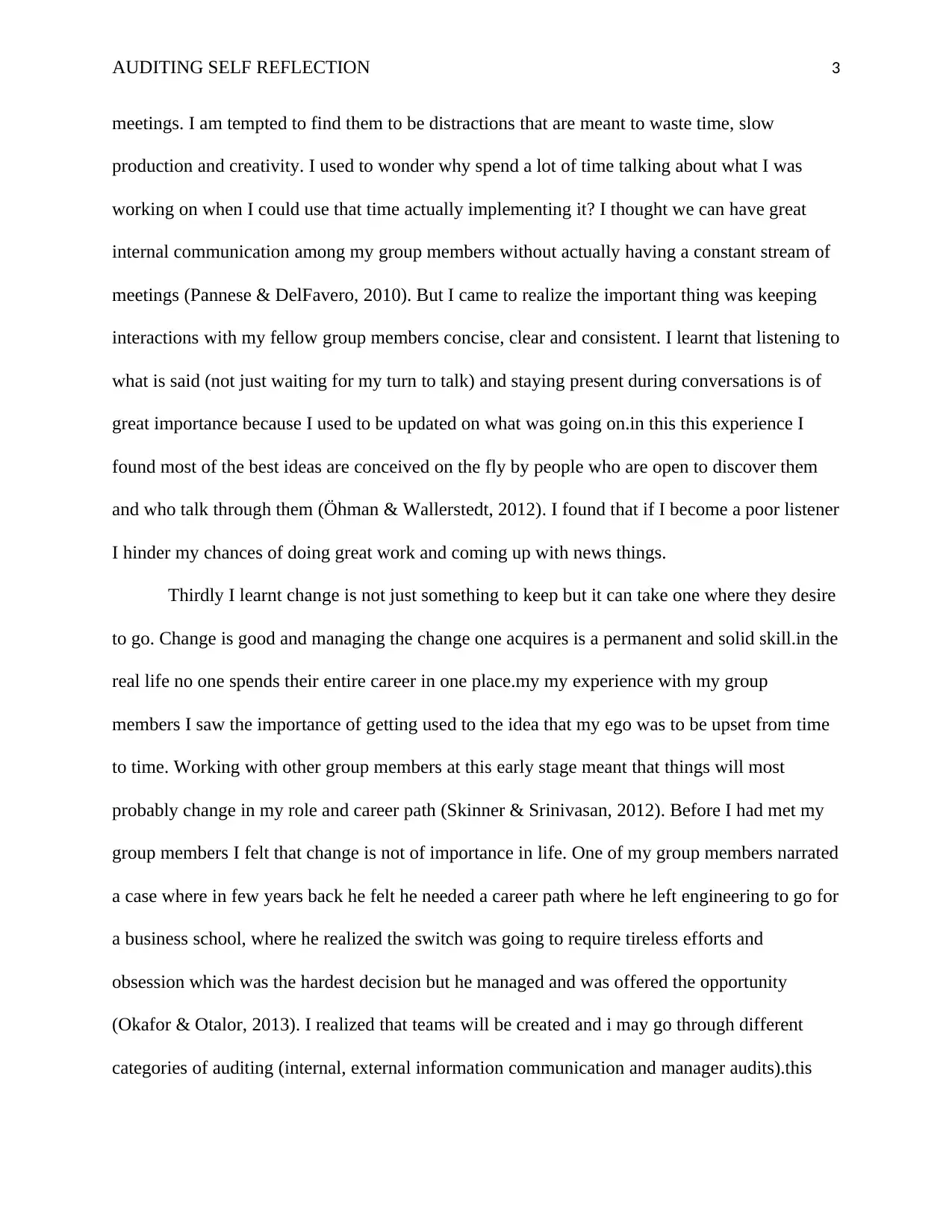
AUDITING SELF REFLECTION 3
meetings. I am tempted to find them to be distractions that are meant to waste time, slow
production and creativity. I used to wonder why spend a lot of time talking about what I was
working on when I could use that time actually implementing it? I thought we can have great
internal communication among my group members without actually having a constant stream of
meetings (Pannese & DelFavero, 2010). But I came to realize the important thing was keeping
interactions with my fellow group members concise, clear and consistent. I learnt that listening to
what is said (not just waiting for my turn to talk) and staying present during conversations is of
great importance because I used to be updated on what was going on.in this this experience I
found most of the best ideas are conceived on the fly by people who are open to discover them
and who talk through them (Öhman & Wallerstedt, 2012). I found that if I become a poor listener
I hinder my chances of doing great work and coming up with news things.
Thirdly I learnt change is not just something to keep but it can take one where they desire
to go. Change is good and managing the change one acquires is a permanent and solid skill.in the
real life no one spends their entire career in one place.my my experience with my group
members I saw the importance of getting used to the idea that my ego was to be upset from time
to time. Working with other group members at this early stage meant that things will most
probably change in my role and career path (Skinner & Srinivasan, 2012). Before I had met my
group members I felt that change is not of importance in life. One of my group members narrated
a case where in few years back he felt he needed a career path where he left engineering to go for
a business school, where he realized the switch was going to require tireless efforts and
obsession which was the hardest decision but he managed and was offered the opportunity
(Okafor & Otalor, 2013). I realized that teams will be created and i may go through different
categories of auditing (internal, external information communication and manager audits).this
meetings. I am tempted to find them to be distractions that are meant to waste time, slow
production and creativity. I used to wonder why spend a lot of time talking about what I was
working on when I could use that time actually implementing it? I thought we can have great
internal communication among my group members without actually having a constant stream of
meetings (Pannese & DelFavero, 2010). But I came to realize the important thing was keeping
interactions with my fellow group members concise, clear and consistent. I learnt that listening to
what is said (not just waiting for my turn to talk) and staying present during conversations is of
great importance because I used to be updated on what was going on.in this this experience I
found most of the best ideas are conceived on the fly by people who are open to discover them
and who talk through them (Öhman & Wallerstedt, 2012). I found that if I become a poor listener
I hinder my chances of doing great work and coming up with news things.
Thirdly I learnt change is not just something to keep but it can take one where they desire
to go. Change is good and managing the change one acquires is a permanent and solid skill.in the
real life no one spends their entire career in one place.my my experience with my group
members I saw the importance of getting used to the idea that my ego was to be upset from time
to time. Working with other group members at this early stage meant that things will most
probably change in my role and career path (Skinner & Srinivasan, 2012). Before I had met my
group members I felt that change is not of importance in life. One of my group members narrated
a case where in few years back he felt he needed a career path where he left engineering to go for
a business school, where he realized the switch was going to require tireless efforts and
obsession which was the hardest decision but he managed and was offered the opportunity
(Okafor & Otalor, 2013). I realized that teams will be created and i may go through different
categories of auditing (internal, external information communication and manager audits).this
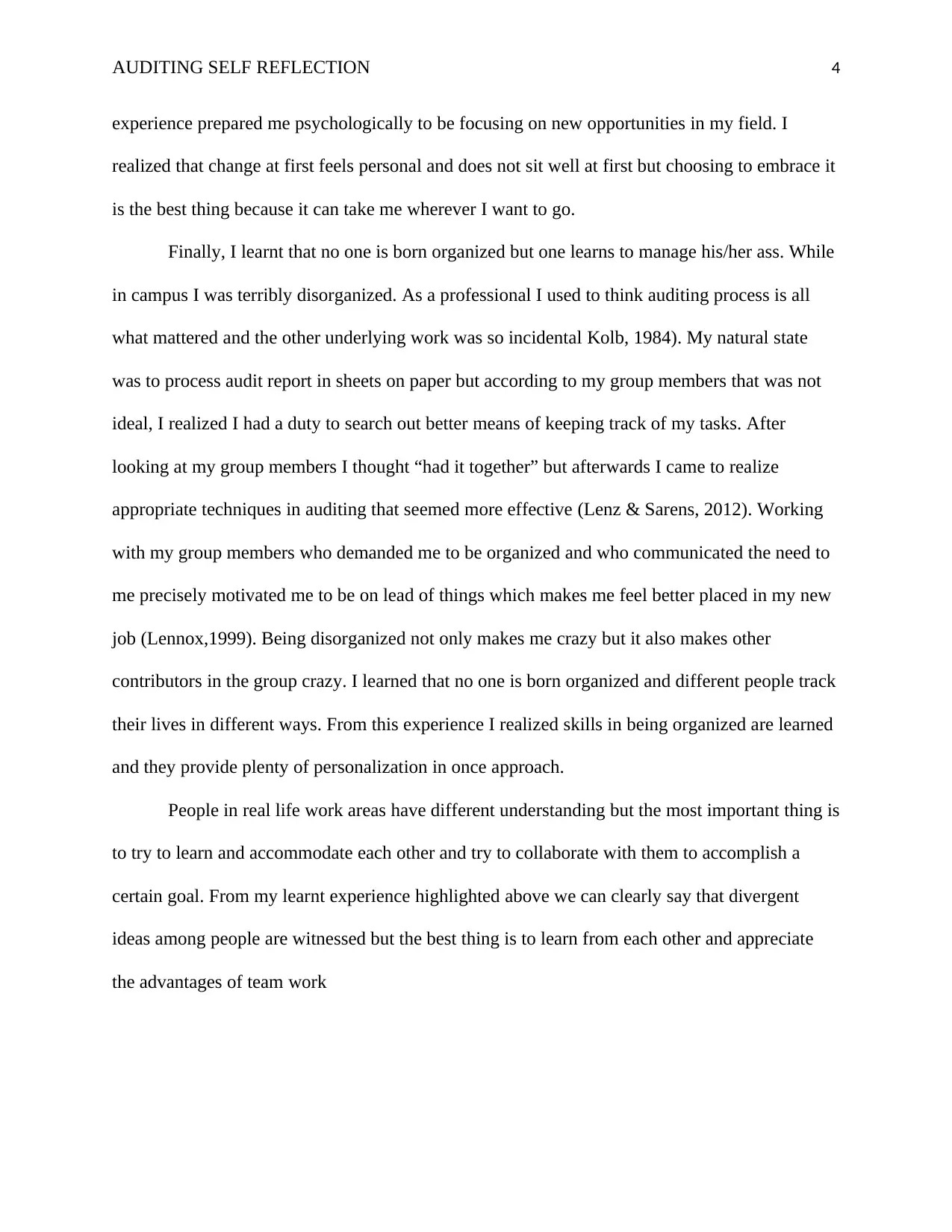
AUDITING SELF REFLECTION 4
experience prepared me psychologically to be focusing on new opportunities in my field. I
realized that change at first feels personal and does not sit well at first but choosing to embrace it
is the best thing because it can take me wherever I want to go.
Finally, I learnt that no one is born organized but one learns to manage his/her ass. While
in campus I was terribly disorganized. As a professional I used to think auditing process is all
what mattered and the other underlying work was so incidental Kolb, 1984). My natural state
was to process audit report in sheets on paper but according to my group members that was not
ideal, I realized I had a duty to search out better means of keeping track of my tasks. After
looking at my group members I thought “had it together” but afterwards I came to realize
appropriate techniques in auditing that seemed more effective (Lenz & Sarens, 2012). Working
with my group members who demanded me to be organized and who communicated the need to
me precisely motivated me to be on lead of things which makes me feel better placed in my new
job (Lennox,1999). Being disorganized not only makes me crazy but it also makes other
contributors in the group crazy. I learned that no one is born organized and different people track
their lives in different ways. From this experience I realized skills in being organized are learned
and they provide plenty of personalization in once approach.
People in real life work areas have different understanding but the most important thing is
to try to learn and accommodate each other and try to collaborate with them to accomplish a
certain goal. From my learnt experience highlighted above we can clearly say that divergent
ideas among people are witnessed but the best thing is to learn from each other and appreciate
the advantages of team work
experience prepared me psychologically to be focusing on new opportunities in my field. I
realized that change at first feels personal and does not sit well at first but choosing to embrace it
is the best thing because it can take me wherever I want to go.
Finally, I learnt that no one is born organized but one learns to manage his/her ass. While
in campus I was terribly disorganized. As a professional I used to think auditing process is all
what mattered and the other underlying work was so incidental Kolb, 1984). My natural state
was to process audit report in sheets on paper but according to my group members that was not
ideal, I realized I had a duty to search out better means of keeping track of my tasks. After
looking at my group members I thought “had it together” but afterwards I came to realize
appropriate techniques in auditing that seemed more effective (Lenz & Sarens, 2012). Working
with my group members who demanded me to be organized and who communicated the need to
me precisely motivated me to be on lead of things which makes me feel better placed in my new
job (Lennox,1999). Being disorganized not only makes me crazy but it also makes other
contributors in the group crazy. I learned that no one is born organized and different people track
their lives in different ways. From this experience I realized skills in being organized are learned
and they provide plenty of personalization in once approach.
People in real life work areas have different understanding but the most important thing is
to try to learn and accommodate each other and try to collaborate with them to accomplish a
certain goal. From my learnt experience highlighted above we can clearly say that divergent
ideas among people are witnessed but the best thing is to learn from each other and appreciate
the advantages of team work
Secure Best Marks with AI Grader
Need help grading? Try our AI Grader for instant feedback on your assignments.
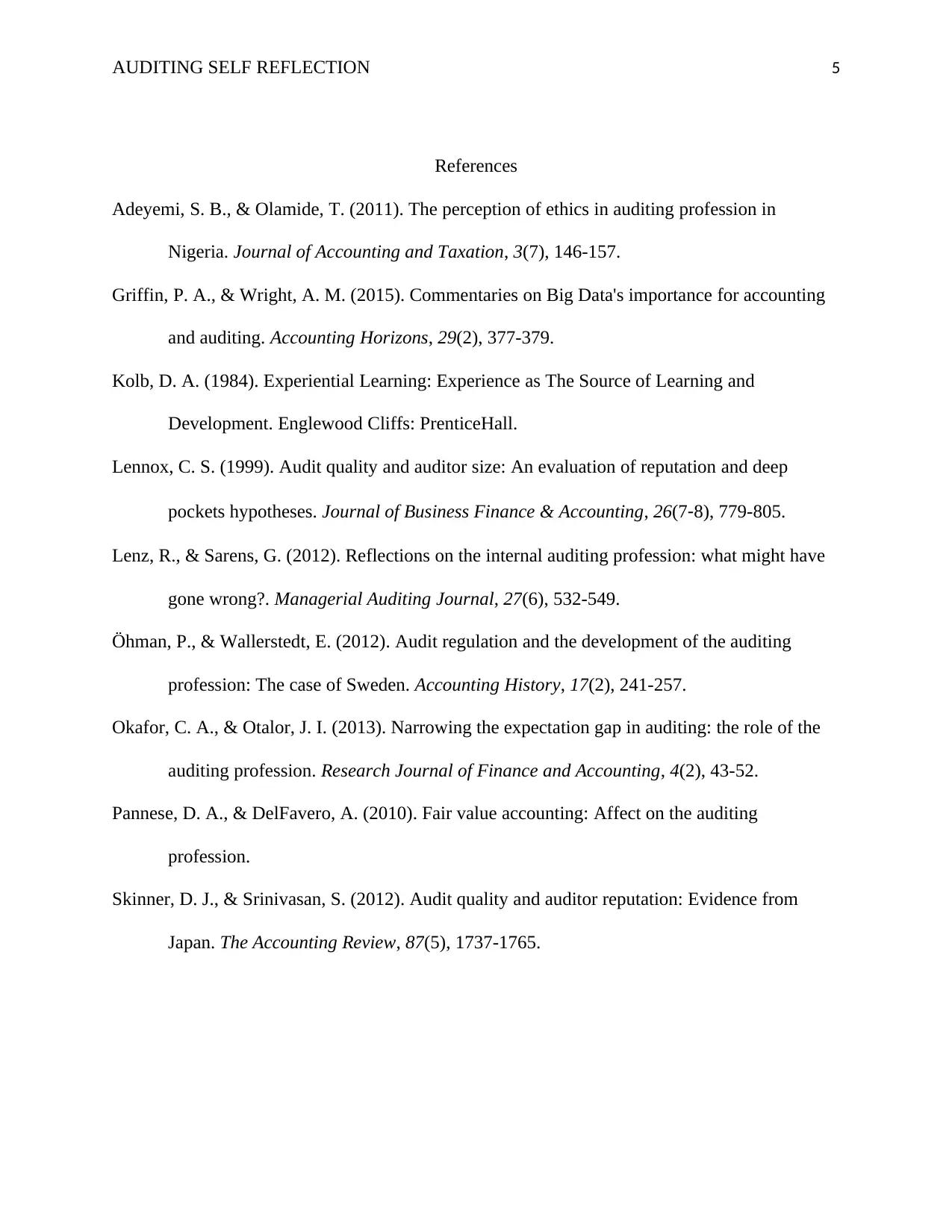
AUDITING SELF REFLECTION 5
References
Adeyemi, S. B., & Olamide, T. (2011). The perception of ethics in auditing profession in
Nigeria. Journal of Accounting and Taxation, 3(7), 146-157.
Griffin, P. A., & Wright, A. M. (2015). Commentaries on Big Data's importance for accounting
and auditing. Accounting Horizons, 29(2), 377-379.
Kolb, D. A. (1984). Experiential Learning: Experience as The Source of Learning and
Development. Englewood Cliffs: PrenticeHall.
Lennox, C. S. (1999). Audit quality and auditor size: An evaluation of reputation and deep
pockets hypotheses. Journal of Business Finance & Accounting, 26(7‐8), 779-805.
Lenz, R., & Sarens, G. (2012). Reflections on the internal auditing profession: what might have
gone wrong?. Managerial Auditing Journal, 27(6), 532-549.
Öhman, P., & Wallerstedt, E. (2012). Audit regulation and the development of the auditing
profession: The case of Sweden. Accounting History, 17(2), 241-257.
Okafor, C. A., & Otalor, J. I. (2013). Narrowing the expectation gap in auditing: the role of the
auditing profession. Research Journal of Finance and Accounting, 4(2), 43-52.
Pannese, D. A., & DelFavero, A. (2010). Fair value accounting: Affect on the auditing
profession.
Skinner, D. J., & Srinivasan, S. (2012). Audit quality and auditor reputation: Evidence from
Japan. The Accounting Review, 87(5), 1737-1765.
References
Adeyemi, S. B., & Olamide, T. (2011). The perception of ethics in auditing profession in
Nigeria. Journal of Accounting and Taxation, 3(7), 146-157.
Griffin, P. A., & Wright, A. M. (2015). Commentaries on Big Data's importance for accounting
and auditing. Accounting Horizons, 29(2), 377-379.
Kolb, D. A. (1984). Experiential Learning: Experience as The Source of Learning and
Development. Englewood Cliffs: PrenticeHall.
Lennox, C. S. (1999). Audit quality and auditor size: An evaluation of reputation and deep
pockets hypotheses. Journal of Business Finance & Accounting, 26(7‐8), 779-805.
Lenz, R., & Sarens, G. (2012). Reflections on the internal auditing profession: what might have
gone wrong?. Managerial Auditing Journal, 27(6), 532-549.
Öhman, P., & Wallerstedt, E. (2012). Audit regulation and the development of the auditing
profession: The case of Sweden. Accounting History, 17(2), 241-257.
Okafor, C. A., & Otalor, J. I. (2013). Narrowing the expectation gap in auditing: the role of the
auditing profession. Research Journal of Finance and Accounting, 4(2), 43-52.
Pannese, D. A., & DelFavero, A. (2010). Fair value accounting: Affect on the auditing
profession.
Skinner, D. J., & Srinivasan, S. (2012). Audit quality and auditor reputation: Evidence from
Japan. The Accounting Review, 87(5), 1737-1765.
1 out of 5
Related Documents
Your All-in-One AI-Powered Toolkit for Academic Success.
+13062052269
info@desklib.com
Available 24*7 on WhatsApp / Email
![[object Object]](/_next/static/media/star-bottom.7253800d.svg)
Unlock your academic potential
© 2024 | Zucol Services PVT LTD | All rights reserved.





